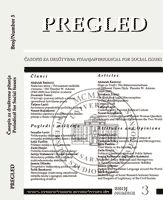Odnos Bošnjaka prema državnom školskom sistemu Bosne i Hercegovine između dva svjetska rata
The Attitude of Bosniaks towards State School System of Bosnia and Herzegovina between the TwoWorldWars
Author(s): Nusret KurjakovićSubject(s): Social Sciences
Published by: Univerzitet u Sarajevu
Keywords: Bosnia and Herzegovina / Kingdom of Yugoslavia; Bosniaks; state; relations; school system; schooling; education
Summary/Abstract: This article deals with the issue of Bosniak attitude towards the state school system of Bosnia and Herzegovina between the two world wars. It investigates the sociological characteristics of B&H and the Kingdom of Yugoslavia of which Bosnia and Herzegovina was a part in the period between the two world wars (1918-1941). In the Kingdom of Yugoslavia, Bosniaks were second-class citizens. The territorial integrity of Bosnia was broken and economic genocide was committed against Bosniaks by the unjustified agrarian reform. The new state became the framework for the implementation of Greater Serbian hegemony. Bosniak nationality and culture were denied. They were considered a religious group and removed from the state administrative apparatus, the judiciary, financial sector, railways, military, police, economy, etc. The Kingdom pursued an unfair school policy. The Kingdom used the natural resources and wealth of B&H to develop other parts of the country. Territorial parts of B&H (so-called banovine) were the most underdeveloped. This position of Bosniaks in the newstate determined their relationship to the state and its school system. Any objective scientist, researching and evaluating this period, must take this fact into account. His/her interpretation and scientific conclusions must be based on the above mentioned fact. That Bosniaks do not appreciate schools and education is a false and unscientific thesis. The central government authority promoted Serbian hegemony, Orthodoxy and Serbian tradition through the school system. These are the basic reasons for the Bosniak negative relationship to such kind of schools. Official data on Bosniak literacy in this period should be taken with a grain of salt, because the state did not recognize
Journal: PREGLED - časopis za društvena pitanja
- Issue Year: L/2009
- Issue No: 2
- Page Range: 217-232
- Page Count: 16
- Language: Bosnian

